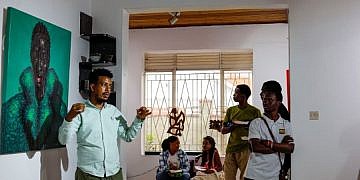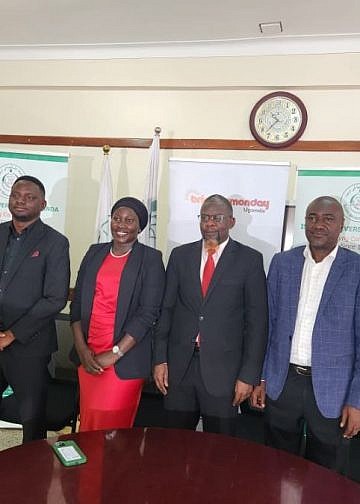A UK court on Friday sentenced Justice Lydia Mugambe to a six-year jail term after being convicted of forcing a young woman to work for her without pay while the judge studied at the Oxford University.
Justice Mugambe, who has been a judge of Uganda’s High Court since 2013, was in 2023 appointed to be a judge for the U.N. International Residual Mechanism for Criminal Tribunals.
Judge David Foxton who sentenced Mugambe to six years and four months in prison said she didn’t show any form of remorse during the trial.
” Instead, you continue, wholly unjustifiably I am afraid, to depict yourself as the victim,” Foxton said.
The evidence
In 2020, Justice Mugambe won a scholarship to further her interest in human rights law by undertaking a D Phil at Oxford University.
According to evidence before court, she arrived in the UK to continue her studies in person in May 2021, and in September 2021 she was joined by her three children.
However, this reuniting of her family brought with it the challenge of reconciling the demands of parenting and running a home alongside her commitments as a postgraduate student, and as a judge of the United Nations, in which role she was expected to undertake a number of overseas workshops.
Court was told that Justice Mugambe had earlier met her victim in Uganda when she was 19 years’ old, and experiencing considerable hardship.
The judge then provided her with employment and accommodation as a nanny and maid in Uganda, as well as supporting her in her studies.
After travelling to the UK for the scholarship, the judge decided to the victim to act as the children’s live-in nanny and her maid, while she was completing her course.
Court was told that Justice Mugambe had initially planned to bring the victim to the UK on a tourist visa.
However, a fateful encounter with the Deputy High Commissioner of the Republic of Uganda, John Leanord Mugerwa, at a reception held by the High Commission for Ugandan students studying in the UK on 20 March 2022, led the judge to embark on another way to take her into UK.
The judge agreed with Mr Mugerwa that he would sponsor the victim’s visa under a special immigration scheme for personal servants of accredited diplomats, on the basis that the victim would take up a job as Mr Mugerwa’s housekeeper, and live with him.
However, there was no such job.
The plan was that on arrival in UK, the victim would live in the judge’s house and work for her as a maid and to this, Mugambe paid the necessary fees for the visa.
To ensure the plan worked out well, the judge and Mugerwa worked together to produce a false contract of employment between the High Commission and the victim, giving particulars of a job which did not exist, and intending that this document and a similarly false Certificate of Sponsorship from Mr Mugerwa for the non-existent job would be used to obtain a visa for the victim.
Meanwhile, Justice Mugambe arranged for the victim to sign the documents, and carefully managed the application process.
These documents were filed in support of the victim’s visa application, and a visa under the special immigration scheme was in due course issued on the basis of those documents.
Mugerwa helped Justice Mugambe after agreeing to help him out in a case in which he was accused back home in Uganda.
Justice Mugambe was supposed to speak to the judge handling the case after Mugerwa’s earlier attempts to speak to the judge himself proved futile as he refused to take calls.
The UK court was told that not only did Justice Mugambe engage in a dishonest conspiracy with Mr Mugerwa to obtain a UK visa for the victim on a false basis, but she also brought the victim to the UK intending to force her to work for her, under the threat of a penalty if the victim did not do what she wanted.
“You did not intend to pay the victim for her work for you in the UK, as you had in Uganda, and you did not do so. Instead the victim was required to undertake a wide range of household tasks, including cooking, cleaning, and childcare responsibilities, in return for her food and board, and the opportunity to take paid employment outside the home, which you initially helped her secure,” the trial judge told Justice Mugambe.
“Over time you increasingly limited the victim’s opportunities to work outside your home because this interfered with the unpaid work you wanted her to do for you, and the victim felt that she had no alternative but to comply with your demands. When you allowed the victim to work, outside the home, it was only on terms which suited you – for example when you and your youngest son went back to Uganda, or, at a late stage in the offending, in a job with anti-social hours after the children were in bed.”
Police finds out
According to evidence, when police approached Justice Mugambe about the victim on 10 February 2023, and at all material times thereafter including in evidence in court, she lied about how the victim came to the UK and the circumstances in which she came to be living and working in her house.
The court said when Justice Mugambe was released on bail, she made a number of attempts to contact the victim through her niece, victim’s pastor and through her family in order to “ intimidate her so she would not give evidence against you.”
The court said this was a clear breach of her bail conditions.
According to evidence, two mobile phones confiscated from Justice Mugambe by the UK Police on August, 7, 2024 gave her out.
Messages from the phones indicated that on 11 July 2024, at 7:47am, she was in contact with your niece and personal assistant, Gloria Serugga, who reported to her that she had been in contact with the victim’s pastor.
Ms Serugga asked Justice Mugambe to contact her about the conversation when she was in the office.
On 17 July 2024, at 6:51am, Ms Serugga asked Justice Mugambe for the victim’s email, which she provided and six minutes later, the judge called the victim’s pastor.
At 9.09am on the same day, Ms Serugga contacted the victim on the email address the Mugambe had provided her with.
The victim later forwarded that email to the police.
At 9.37am, Ms Serugga sent Mugambe an email attaching a recording of a conversation she had had with the pastor, in which the Pastor was asked to contact the victim, including by email because “Auntie Lydia’s reputation is at stake. We are worried and we have tried everything.”
Meanwhile, 23 minutes later, Mugambe sent Ms Serugga an email stating “tell him” which the court said was clearly an instruction to tell the victim’s Pastor – “the police wants to take me to court in like 2 weeks.
“ But if [the victim] tells them she has dropped interest they have no case to take to court. ….. around Feb.”
According to the court, the case was due to start (and did start) in February 2025.
On 2 August 2024, a legal researcher who worked for Mugambe in Uganda named Anne sent her a message stating that she had had found someone who could give her the contact details to approach the victim’s mother.
Evidence shows, Justice Mugambe replied, saying “we need [the victim’s] mum to convince [the victim] to stop betraying us.”
The UK court ruled that these events reflected a conspiracy between Justice Mugambe, Ms Serugga and her researcher to try and contact the victim through the judge’s niece, the victim’s mother and her pastor, in an effort to intimidate the victim so that she would not give evidence against her.
“ This is a serious offence, and as a judge you must have been fully alive to the criminal nature of this conduct,” the court said.
“I am satisfied that this offence was one of high culpability. The facts giving rise to the offence involved sophisticated and planned conduct, in which you involved two other people, using various routes to contact the victim for the purpose of pressurising her into not giving evidence against you – direct contact, contact through the victim’s family and contact through the victim’s Pastor. No lower culpability factors are present – this was not unplanned contact, you were not subject to coercion, intimidation or exploitation, and there is no factor which substantially reduces your responsibility.”







































